| Listing 1 - 10 of 23 | << page >> |
Sort by
|
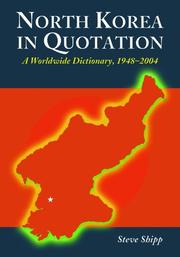
ISBN: 078642107X Year: 2005 Publisher: Jefferson McFarland
Abstract | Keywords | Export | Availability | Bookmark
 Loading...
Loading...Choose an application
- Reference Manager
- EndNote
- RefWorks (Direct export to RefWorks)
"The 20 categories covered here provide an overview of the breadth of issues facing the Northeast Asian country. For each quote, the speaker and his or her title are identified, along with the original source of the quotation and its context. Indexed by speaker, subject and keywords"--Provided by publisher.
Book
Year: 2005 Publisher: Seoul : Korea Institute for National Unification,
Abstract | Keywords | Export | Availability | Bookmark
 Loading...
Loading...Choose an application
- Reference Manager
- EndNote
- RefWorks (Direct export to RefWorks)
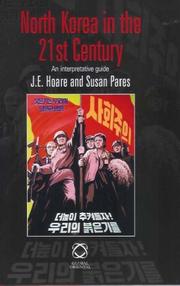
ISBN: 9789004213791 9781901903911 Year: 2005 Publisher: Leiden; Boston : Brill
Abstract | Keywords | Export | Availability | Bookmark
 Loading...
Loading...Choose an application
- Reference Manager
- EndNote
- RefWorks (Direct export to RefWorks)
North Korea is not easily accessible, but boasts some of the most beautiful scenery in the Korean Peninsula, and arguably in East Asia. Travel to and in the Democratic People's Republic of Korea is tightly controlled, while political, economic, social and cultural life is played out in terms of a not readily understood philosophy, known as juche. The country maintains a watchful and often defiant relationship with the rest of the world and insists on following its own standards and norms at all times. Nonetheless, North Korea is slowly adjusting to the great changes that have taken place since the collapse of the Soviet Union. One important expression of this softening of attitudes is its willingness to allow a greater number of foreigners to enter and live in the country. In the belief that it is better to try to understand than to routinely condemn, the authors have attempted to interpret what they observed around them during their almost two-year stay in the DPRK setting up the first British Embassy in Pyongyang (the story of which is to be found in Part III of this book). The country's reputation as a difficult partner in world affairs could not be ignored, but for them that was never the whole story. Here was a society operating certainly along very different lines, but which in its essentials was recognizably Korean. The contents cover North Korean politics, the economy, the role of history, society, cultural values, and visiting and living in the DPRK.
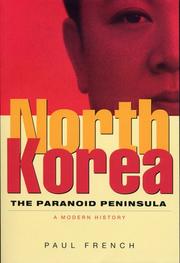
ISBN: 1842774735 Year: 2005 Publisher: London : Zed Books,
Abstract | Keywords | Export | Availability | Bookmark
 Loading...
Loading...Choose an application
- Reference Manager
- EndNote
- RefWorks (Direct export to RefWorks)
Map
Year: 2005 Publisher: [Washington, D.C.] : [Central Intelligence Agency],
Abstract | Keywords | Export | Availability | Bookmark
 Loading...
Loading...Choose an application
- Reference Manager
- EndNote
- RefWorks (Direct export to RefWorks)
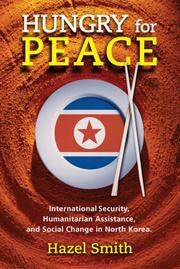
ISBN: 1929223587 Year: 2005 Publisher: Washington United States institute of peace press
Abstract | Keywords | Export | Availability | Bookmark
 Loading...
Loading...Choose an application
- Reference Manager
- EndNote
- RefWorks (Direct export to RefWorks)
Smith describes the famine that devastated the country in the 1990s and the international rescue program that Pyongyang requested and received. Together, the famine and the humanitarian response have wrought subtle but profound changes in North Korea's economy, society, and security outlook. Smith argues that the regime has been prodded into accepting some international norms, allowed markets to develop, and has included some human security concerns alongside military-political interests in its negotiations with the West.
Famines --- Humanitarian assistance --- Korea (North) --- Foreign relations. --- Politics and government.
Book
Year: 2005 Publisher: Carlisle, PA : Strategic Studies Institute, U.S. Army War College,
Abstract | Keywords | Export | Availability | Bookmark
 Loading...
Loading...Choose an application
- Reference Manager
- EndNote
- RefWorks (Direct export to RefWorks)
Korea (North) --- United States --- Strategic aspects. --- Foreign relations
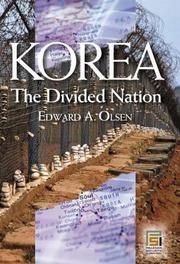
ISBN: 0275983072 Year: 2005 Publisher: London Praeger Security International
Abstract | Keywords | Export | Availability | Bookmark
 Loading...
Loading...Choose an application
- Reference Manager
- EndNote
- RefWorks (Direct export to RefWorks)
Korean reunification question (1945- ) --- Korea (North) --- Korea (South) --- Korea --- History.
Book
Year: 2005
Abstract | Keywords | Export | Availability | Bookmark
 Loading...
Loading...Choose an application
- Reference Manager
- EndNote
- RefWorks (Direct export to RefWorks)
Nuclear arms control --- Nuclear facilities --- Korea (North) --- United States --- Politics and government --- Foreign relations --- Korea (north) --- Korea --- Political science
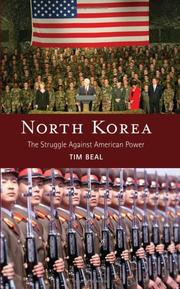
ISBN: 0745320139 0745320147 Year: 2005 Publisher: London Pluto
Abstract | Keywords | Export | Availability | Bookmark
 Loading...
Loading...Choose an application
- Reference Manager
- EndNote
- RefWorks (Direct export to RefWorks)
Nuclear weapons --- World politics --- Korea (North) --- United States --- Foreign relations --- Military policy. --- Politics and government.
| Listing 1 - 10 of 23 | << page >> |
Sort by
|

 Search
Search Feedback
Feedback About UniCat
About UniCat  Help
Help News
News